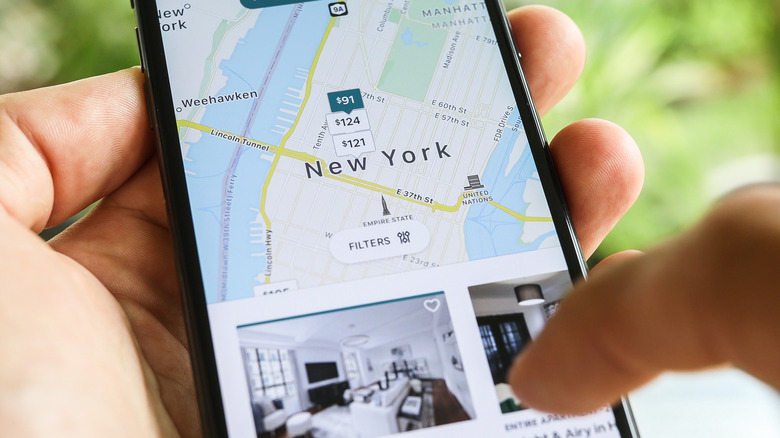How To Avoid A Fake Listing When Booking A Vacation Rental
Perhaps the only thing worse than getting catfished on a dating app is getting catfished on a vacation rental app. Rental scams have gotten rampant in recent years as tourists are looking to satisfy their travel itch after years of being cooped up at home. Opportunists are on the pounce to stiff them out of their money, reeling them in with listings on property rentals that don't even exist. And on the off chance that they do, they're usually a dud.
Cybersecurity expert Hiram Del Amo told The New York Post that there's a deluge of these rental scams on platforms like Craigslist and Facebook, with many of the listings turning out to be fake. "I would say somewhere around 20%-25% are probably fraud," he said. The outlet even noted that per the FBI, over $350 million have gone down the drain due to property rental scams in 2021 alone. What's worse, some scams exist on websites we've known to be legitimate, like Airbnb and Vrbo.
Now, this isn't to discourage you from ever booking vacation rental properties again. For the most part, these properties are a good way to save money on your trips, and they come without the constraints of a hotel. But if you were to book rentals on your future travels, here are some pointers to keep in mind.
Read through reviews and comb through the listing carefully
When it comes to booking vacation rentals online, you have to operate under a single rule, which is if it's too good to be true, it probably is. You don't want to waste your hard-earned money on a non-existent listing or one that is far from the actual thing, so you need to exercise utmost caution when you're sifting through properties. For starters, it pays to read through the specifics of a certain listing before taking the plunge. A traveler told The Washington Post that she was once duped into booking a trailer instead of an actual house. If a listing markets itself as, say, a "manufactured home," it's likely just wordplay.
It's also of equal importance to read through a property's reviews. Check if they are legitimate reviews from people or are fabricated. Usually, fake reviews tend to sound the same or are worded similarly. They are also often posted on the same date or too close to each other. In the event that there are zero reviews, though, it may mean that the listing is new, which is common in the rapidly-growing market. You can verify it by assessing the profile of the owner and checking if they have reviews on other properties. If you want to give it a chance, though, make sure you're booking on reputable platforms like Airbnb so you can at least recoup your losses if it turns out to be a scam.
Never pay outside of the platform
One of the biggest red flags of scammy listings is the property "owner" pressuring you to book ASAP. If they're incessant with their hounding or even threaten that they'll offer the listing to someone else, it may be best to run for the hills and look elsewhere. "If somebody is putting a lot of intense pressure on you to get you to pay for something quickly or to sign a lease agreement before you feel prepared to, you should always stop, take a step back, and ask yourself why," travel blogger Rocky Trifari shared with HuffPost. What's more, if the owner is asking you to pay through a third-party app instead of the platform with the added bonus of a discount, it's also usually a sign that they're a scammer. Paying strangers through apps like Venmo or Zelle is not the smartest move, and you'll have a hard time (see also: never) getting your money back if you get scammed.
When booking vacation properties, you always have to be vigilant. Most of the time, it's worth paying a few extra dollars on a pricier yet legitimate listing than one that saves you money but exhibits multiple red flags. The last thing you want is to ruin a vacation because you ignored the warning signs. And as always, it's better to trust your gut. It's almost never wrong.


